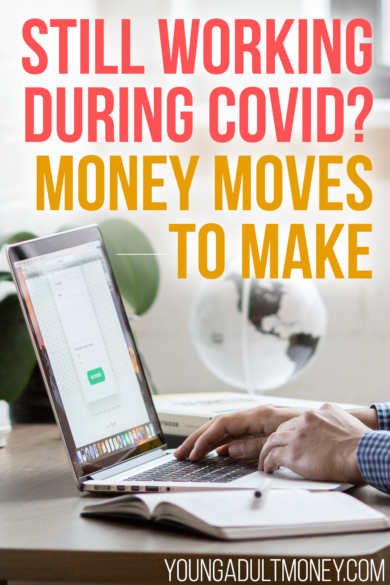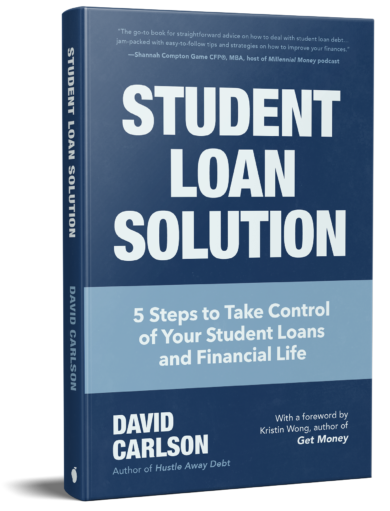 More than 40 million Americans have become unemployed since COVID spread across the nation in March 2020. There is no sign of how long this high level of unemployment will last.
More than 40 million Americans have become unemployed since COVID spread across the nation in March 2020. There is no sign of how long this high level of unemployment will last.
If you or someone you know has lost their income or had their hours reduced due to COVID, there is thankfully unprecedented relief available. From expanded unemployment benefits to a pause on federal student loans, there is help available.
But there are still many who are still employed during COVID. They are still receiving paychecks and may have health insurance or other benefits from their employer.
If you fall into this group there are a number of money moves you should consider making. COVID has created uncertainty around when things will be “back to normal” and how long the economy will be stuck at a crawl. Not surprisingly the money moves I am going to share will be geared towards bulking up your finances so they can weather difficulties.
Bulk Up Your Emergency Fund
COVID has made many finally realize how helpful an emergency fund can be. I’ve argued in the past that having 3 to 6 months of expenses in cash is more important than eliminating debt.
Think about it: if you were suddenly unemployed would you rather have $1k in cash and no debt, or $20k in cash and $19k in debt?
Cash gives you breathing room when an emergency happens, and we’ve seen from COVID that there are more emergencies than we previously thought.
While 1-month of expenses is better than no savings, I think we will see the rise of the “jumbo” emergency fund, which is what I am calling a 12-month emergency fund.
Having 12 months of expenses set aside in cash can give you a long runway if you suddenly find yourself unemployed, or unable to work due to a medical condition. It gives you time to explore options and continue living your life.
If you save up 12-months of expenses, it also is very realistic that you could stretch your expenses further than 12-months. You may receive unemployment, severance, or make money through a side hustle during this time. You also have opportunities to cut expenses like going from two cars down to one, which would both give you a cash infusion from the sale of a vehicle as well as cutting out that vehicle’s insurance costs.
Having this money set aside may seem excessive but – as COVID perfectly illustrates – life can be more unpredictable than we think.
One criticism of keeping this much in cash is that you are missing out on opportunities to gain more money by exposing the cash to the stock market. While this is true, exposing your emergency fund to the stock market defeats the entire purpose of an emergency fund. Instead, you can put it in a high-yield savings account like CIT Bank which pays 0.55% APY. Sure, it may not keep up with the stock market over time, but it does help your cash keep up with inflation.
Understand Your Debt
An emergency fund should be your top priority, and then you should move on to paying down debt.
If you have credit card debt I’m likely not the first person to tell you that the high interest rate you are paying is costing you. After an emergency fund you should focus on paying down high interest debt.
High interest debt isn’t the only debt that you may have. If you download our free student loan spreadsheet there is a tab specifically for inputting all your student loan debt and a separate tab for all non-student loan debt. This will help you understand:
- How much debt you have overall
- What types of debt you have
- The interest rates on your debt
This can be a sobering experience, but it’s much better to do this while you are employed than when you lose your job. The good news is that there are typically a number of strategies you can use to strategically pay down your debt. We’ll go into that next.
Strategically Pay Down Debt
One thing I hope you can appreciate about me is that I don’t just blindly put all debt into one bucket. When I picture some personal finance experts I see them hitting people over the head with a meter stick saying “debt bad! debt bad!”
In reality there are ways to strategically repay it and, in some cases like student loans, even give it forgiven by the government. It’s borderline irresponsible to not bring these strategies into the debt conversation.
Let’s start with the biggest culprit: high interest debt.
- High Interest Debt
If you have credit card debt or other high interest debt, there are a couple of ways to pay it off faster and both involve lowering the interest rate.
With credit card debt you can use a 0% APR transfer card. When you open one of these cards and transfer a balance from another credit card you are given a period of time – typically between 12 and 15 months – where the interest rate is 0%. You should use this time to pay down as much – or all – of the credit card balance.
Another option that works with credit card and other high interest debt you can get a rate quote for a personal loan with a bank such as SoFi. The lower the interest rate the more money you put towards the principal of your debt.
Finally, if you are feeling completely overwhelmed with the debt you face, it may make sense to work with a debt lawyer. I’ve had a number of conversations with Leslie Tayne and I feel comfortable recommending her services (I am not compensated for referring her).
- Student Loans
For many reasons student loan debt is the best type of debt you can have. Federal student loans come with many protections such as income-driven repayment options, accrued interest that is calculated as simple interest instead of compound interest, opportunities for loan forgiveness, and interest subsidies to name a few.
Private student loans have received increased competition as well, and refinancing can be a big win, especially in this age of low interest rates. You can get rate quotes at both Credible and SoFi to see what options are available to you.
The uncertainty that COVID has caused in our economy is the perfect example of why it is important to repay your student loans strategically. My book Student Loan Solution: 5 Steps to Take Control of Your Student Loans and Financial Life can help you navigate the complex world of student loan repayment and create a strategy that is right for your unique situation.
- Low-Interest Debt (5% or Lower)
5% is generally the cut-off that experts use when advising people whether they should pay off debt or invest in the stock market. If your mortgage, car loan, or other debt is at an interest rate of 5% or less you should consider paying the minimum and using excess cash flow to invest – assuming you have an emergency fund.
There are likely a few outliers – especially in a COVID world – who would recommend investing over paying off debt even if you are in the 5-7% range. The reason why? Because it creates additional liquid capital that you can access in an emergency (more on that in a minute).
Build up your Non-Retirement Investments
One thing that was undervalued prior to COVID was non-retirement investments. This is any stocks, mutual funds, gold (diversification anyone?) or any other asset. But for simplicity sake we will assume these are stocks or mutual funds.
One thing I have done since COVID is create a detailed net worth spreadsheet. We already went over how debt is important to review and strategically repay, but what I focus on in this spreadsheet is the top section. Here are the three sub-totals I hone in on:
- Cash
- Cash + Non-Retirement Stocks and Mutual Funds
- Cash + Non-Retirement Stocks and Mutual Funds + Health Savings Account (HSA)
From a safety and conservatism perspective, nothing can replace cash. Even if the stock market went to zero, your cash would be safe (assuming it is in an FDIC insured bank account, which it almost certainly is). But the next component that can keep you afloat is non-retirement stocks and mutual funds.
 If you burn through all your cash you can start selling your non-retirement assets. This could add a full year or even multiple years of protection for your finances. In my net worth spreadsheet, I calculate how many months of expenses I have in cash. Then I calculate how many months my non-retirement stocks and mutual funds would add to that runway. In a COVID world it would be ideal to have an additional 12-24 months of expenses in non-retirement stocks and mutual funds.
If you burn through all your cash you can start selling your non-retirement assets. This could add a full year or even multiple years of protection for your finances. In my net worth spreadsheet, I calculate how many months of expenses I have in cash. Then I calculate how many months my non-retirement stocks and mutual funds would add to that runway. In a COVID world it would be ideal to have an additional 12-24 months of expenses in non-retirement stocks and mutual funds.
If you aren’t there yet, or nowhere near it, don’t worry: the figures I’m throwing out can take years and years to build up. The main point is for you
One exception to both debt repayment and building up non-retirement assets: The Employer Match for Retirement
If you are fortunate enough to have an employer match for retirement accounts you should take full advantage of it. Even at a 50% match you are getting incredible return on investment. These employer perks are set up because there inevitably will be some people who won’t take advantage of them – don’t be that person!
To be clear, this is not the “typical” order that you would work on your finances.
Very few thought that anything remotely close to a 12-month emergency fund would be needed.
But the reality is I know people who have had both their income and their partner’s income wiped out overnight, with no idea when it will come back.
Yes, there is unemployment, stimulus checks, a pause on student loan payments, and other measures the government has taken, but those measures may not be in place – or at least not to this extent – when your income is eliminated.


There is also the possiblity that you cannot work and earn so you spenet all Emergency fund and now you must to ask a little loan…is a weird and complicated time
Hello David,
This is my first time on your blog.
You’ve got an interesting article.
Honestly speaking, I’d rather have $1k cash than have $20k cash and be $19k in debt.
If there’s anything I learned during this COVID-19 is to stay away from loans as much as I can because an emergency like this can throw one off-balance and confused.
As though I knew, I took my savings skills seriously in January 2020 and saved up over 6 months of living expenses. Though I never had to touch it again I have learned to keep building it up.
One with cash in the hand has more options and opportunities than one that is cashless and clueless.
I love these money moves you wrote about here.
Keep it up.
Emenike
Thanks for sharing your thoughts Emenike! Interesting to hear you’d rather have just $1k in cash with no debt. I think it’s easy to say that but if you ended up in a situation where you are unemployed and have just $1k of cash you may end up taking out higher-interest loans (or credit card debt) to get by.